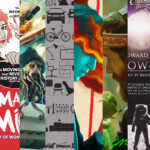The internet can be an amazing place for creatives. Since its inception, we’ve been turning to the web for creative inspiration and communities. But the noise is getting louder. Finding useful dialogue and ideas requires more searching, scrolling, and sifting. As the internet becomes more and more stuffed with stuff, we increasingly rely on thoughtful curation to help us find what has real value. In this context, the amplification and intentional sharing that happens in online communities can be the most valuable and organic form of curation.
It’s not uncommon for those with hyper-specialized skill sets (be they designers, developers, copywriters, editors…) to feel like an island in the wider ecosystem of their workplace or industry. As digital collaboration becomes standard and more and more companies and people opt for the freedom of remote and freelance working, looking to the internet to build a network of colleagues-by-proxy makes more sense than ever – in fact, it’s a key to developing a gainful and balanced business model of any scale in a shape-shifting economy.
There are many online spaces built by and for creatives to nurture the exchange of ideas, and grow the complementary skill sets (especially on the often-neglected business side) that make a creative career viable. Whether you want to connect on broad subject matter to get you thinking outside the box, or more focused discussion, communal knowledge-sharing provides a working space to channel creativity and passion into lucrative ideas while challenging your perspectives.

Here’s where to find meaningful creative inspiration, conversation and networking online – and how to build community around it:
…for Creative Inspiration
For people working in creative fields, inspiration is the wellspring of all professional fulfillment – and so seeking like-minded individuals who find inspiration in the same things that we do makes sense as a starting-point for building community.
We can’t dismiss the power of Instagram, Pinterest, Dribble and other visual-first social networks as tools that put nearly infinite sources of creative inspiration directly at our fingertips. At the same time, many of us would attest that spending too much time on these platforms can be a deterrent to creative energy. While they are effective channels for media distribution and consumption, the social element doesn’t always feel constructive or meaningful. This is due to the way algorithms are increasingly oriented to reward only those willing to play the treadmill-like game of pushing out a continuous stream of shiny content.
Carving out space to build constructive relationships and meaningful exchanges on these platforms can feel something like chasing a carrot on a stick, and sorting through the superficial to find elusive flashes of brilliance isn’t a valuable use of anyone’s time.
Fortunately, there is no shortage of alternatives to endless scrolling. And many of them provide access to a greater depth of ideas and a sense of community – something that just can’t be produced by algorithm alone.
Lecture and webinar series like CreativeMornings gather like-minded individuals from different industries for informal learning in the form of talks, virtual panels and interviews with fascinating people doing fascinating work.
If you prefer to engage on your own time, consider subscribing to a thought-provoking podcast: On Design Matters, Debbie Millman (known in some circles as design podcasting’s queen) investigates “how incredibly creative people design the arc of their lives.”
The Smart Agency Master Class is another interview-format podcast targeted at digital agency owners.
If newsletters are more your speed, Subtle Maneuvers delivers “a new mini-profile of a brilliant creative person’s day” alongside a practical advice column to your inbox each Monday.
Beyond simply providing creative inspiration, the community element enters once you find a source of inspiration, whether a series, show or medium that inspires your creative process and becomes a part of your routine. All the creativity-inspiring sources above have spin-off groups tailored to their precise audiences that are incredibly valuable to participate in – but more on that later.
Some other favorites:
- Being Freelance, a much-loved podcast and community eleven seasons strong.
- Hurry Slowly is “a show about how you can be more productive, creative, and resilient through the simple act of slowing down.”
- The Daily Carnage has built a loyal base of more than ten thousand subscribers who share enthusiasm for the newsletter’s curation of digital marketing news and sharp commentary. And it has great overlap and relevance with creative productivity.
- 99% Invisible is a hugely popular podcast that prompts listeners to consider the things we don’t think about – “the unnoticed architecture and design that shape our world.”
- Maria Popova’s Brain Pickings newsletters and blog will feed your mind, invigorate your thinking – and basically make you smarter.
- Among CBC’s offerings are a duo of shows that explore the ongoing shifts in the way we engage with media: Under the Influence, a radio series on “a new-world order of two-way dialogue” in marketing and advertising, and Spark, a podcast on tech’s impact on culture, and vice-versa.
- Meetup, a platform where special interest groups traditionally organize online to host and attend live events locally, has recently pivoted to online events – a great opportunity to join niche groups that might have been geographically inaccessible until recently.

…for Creative Conversation and Networking
Bouncing an idea off of an objective third party, or need to find someone with expert knowledge of a tool or resource? Or do you have some wisdom and experience someone else might be able to build on? (Mentorship – however informal – is a surefire way to stay current and challenge ingrained ways of thinking.) In this “era of messaging apps” people in creative industries are using platforms like Slack and Discord to build thriving professional communities. Lively networks have also found a home in “closed” groups on Facebook.
These more private corners of the internet offer a reprieve from the unfocused and sometimes inflammatory discussion that tends to populate generalized social media news feeds. Because groups on these platforms often have a vetting process to deter spam and are governed by community guidelines, they are better sources for niche discussions and technical advice, and sometimes more abstract conversation and watercooler chat, too.
Some communities on Slack come with a membership fee, like CreativeTribes, where $27 grants you access to a group of more than 1,300 “startup entrepreneurs, strategists, marketers, writers, developers, designers, remote workers and other creatives,” as well as moderated AMA live chats that promise “actionable advice.”
Online Geniuses is the biggest marketing community on Slack, and basic membership is free.
Some of the most active communities on these platforms derive from other popular digital media with large fanbases: In the Daily Carnage Facebook group, (a spin-off community based on the newsletter, mentioned above), members regularly crowdsource advice from more than 13,000 peers in marketing, and post the odd meme.
LinkedIn of course looms large as the mainstream professional networking platform, but its broad, big-business-oriented (self-promotion and selling) framework sometimes misses the mark for those in creative fields – to the point that it can be unwelcoming and off-putting.
Alternative “all inclusive” platforms or collectives can fill in the gaps, and often offer targeted professional development opportunities as well: the Rising Tide Community is one that brings creative entrepreneurs and small business owners together with a focus on practical resources and guides, connecting locals in more than 400 cities through meet-ups, and a Facebook group with more than 70,000 members.
More groups worth joining:
- ProductTribes, is an invitation-only group for “experienced designers, developers, and PMs” on Slack – and is a veritable gold mine.
- For the untethered among us, Digital Nomads is a popular (and free) Slack channel that acts as a mutual support network for freelance and remote workers in a variety of creative industries.
- United Designers is a community for those passionate about design.
- Platform-specific groups like The Agency Exchange by Sprout Social can be an effective way to find people whose work overlaps with your own in some capacity and become more versed in what your stack can do.
- The Digital Marketers Organization is building an all-in-one platform that functions as a social network. Members can also participate in virtual happy hours, attend webinars and courses and join private sub-groups for executives and other targeted groups.
- Digital Agency Owner Insiders on Facebook is a very active group exclusively for, you guessed it, agency owners. The group is affiliated with the Smart Agency Master Class podcast.
Find the Right Fit…and Engage
We’ve only scratched the surface here, and finding a community that adds value to your creative and professional life is ultimately a journey – it can take time to find your people. Once you have, it’s important to give as much as you take; reciprocal engagement is what makes a community more than a dumping ground for self-promotion, or a last resort to find a solution to an urgent creative challenge.
As a creative, you may have done most of your professional networking offline, with a drink in your hand, at themed after-work drinks, a gathering at someone’s house or maybe even the museum. But as many industries shift towards a culture less anchored to physical work spaces and work becomes increasingly specialized, the rewards of investing your time in building a network of “colleagues without borders” who broaden your perspective and inspire great creative work are undeniable.







